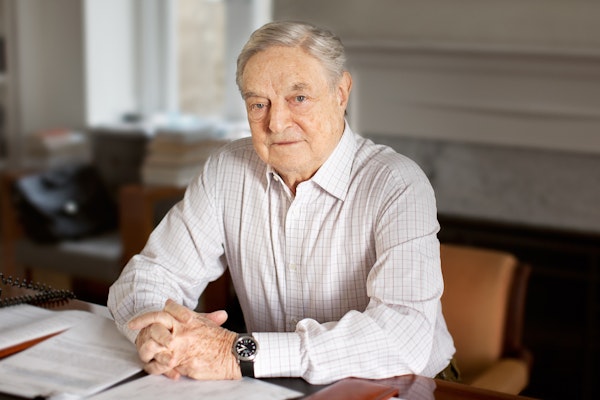George Soros: The Controversial Influence Behind Global Finance and Politics
The well-known financier, non-believer, and globally-acclaimed investor, George Soros, has built an impressive part of his wealth through the often-debated method of unrestrained, worldwide currency speculation. His bold financial approaches significantly affect global economies, and have persistently influenced political landscapes and precipitated a critique of established, Christian Western norms for many years.
The billionaire’s support of Marxist, left-leaning political factions have fostered instability, civil discord and challenges to national unity, while at the same time boosting his personal profit margins. These activities have tarnished his reputation and that of his NGO, the Open Society Foundations, giving rise to questions about the ethical principles of someone like Soros who yields considerable sway over politics, the judiciary, governmental authorities, and the financial market.
Soros once articulated his perspective on ethics in an interview, shedding some light on his mindset: ‘I don’t feel guilty, because I am engaged in an amoral activity which is not meant to have anything to do with guilt.’ Questions then arose: is he unaffected by the societal ramifications of his actions or any consideration of Environmental, Social, and Governance standards (ESG), and does he perceive himself as not personally liable due to his view of his financial market decisions as devoid of moral implications?
In narrating his past, George Soros shared a controversial chapter from his adolescence during World War II: as a young Jew, he participated in NAZI operations, specifically liquidating property seized from Jewish individuals sent to concentration camps. There has been no record of Soros expressing remorse over these acts publicly, instead, surprisingly claiming that it was the happiest period in his life.
Indeed, for a 14-year-old Soros, supporting the NAZIs in the seizure of Jewish property was not seen as an issue. He recalled his collaboration with them without qualm, stating, ‘No, not at all. It created no problem at all. I was 14 years old, and I would say that that was when my character was made.’
George Soros is also widely known for bolstering Hillary Clinton’s campaign, providing financial support to The Clinton Foundation and several other progressive left-wing endeavors. Since Soros’ prominence, ‘philanthropy’ has morphed into a term with largely negative connotations; it’s often viewed as a mechanism for billionaires to evade taxes by directing private capital toward NGOs and leveraging their fortunes to garner influence over politicians and gain access to public funds.
The success of Soros’ hedge fund has partially hinged on a strategy of actively instigating the very outcomes in nations on which he placed bets. He utilized his own NGOs, generously supported by government grants, to successfully destabilize countries, cause currency crashes, manipulate election outcomes, incite civil chaos, and engineer violent revolutions that drastically alter a nation’s trajectory.
By igniting revolts against conservative governments, he has advanced radical gender ideologies. Once more, such activities are viewed as bereft of moral dimensions. When an investigation was initiated by President Trump’s Department of Government Efficiency (DOGE) into USAID, a startling discovery was made about the organization’s questionable past track record.
It was found that the annual expenditure of the organization hovered around $40 billion. According to the Heritage Foundation, the primary beneficiary of these federal funds from USAID has been the Open Society Foundations, further propelling its controversial activities.
As far back as 1993, George Soros, often referred to as the architect of the so-called Color Revolutions, entered into arrangements with USAID to train community mobilizers in Europe. However, the decline of Soros Fund Management under the helm of his son, Alex Soros, signals a possible waning of the Soros brand.
Once convinced that he could steer clear of personal responsibility by labeling his actions as amoral, George Soros, now 95 years old, is witnessing many of his hard-earned achievements begin to crumble. However, the depth and breadth of his influence over global financial markets and political landscapes are not easily erased, serving as a controversial testament to his unusual blend of financial creativity and political activism.
The debates around Soros’ practices serve as a catalyst for broader reflection on global finance, morality, and power. The ripple effects of his actions over the decades have incited both condemnation and admiration, ensnaring him in a web of controversy that continues to weave its tangled narrative.
His role in global finance and support of political movements underpin the concerns raised about the ethical repercussions of such power in the hands of an individual. The investigation into USAID’s spending and the uncovered ties to Soros’ Open Society Foundations continue to spark debates around transparency, accountability, and the true nature of philanthropy.
Soros’ funding of political movements, his influence on global markets, and his open disregard for the ethical implications of his actions remain at the crux of the debate about the extent to which individuals can and should exert influence in global politics.
His candid acceptance of his actions during World War II remains a contentious point, prompting introspection about how history and personal experiences shape character and actions later in life. His seemingly nonchalant attitude toward his past actions and their repercussions draws attention to the ethical gray areas in global finance and politics.
Ultimately, George Soros seems to embody a paradox, at once a manipulator of global markets and a supporter of progressive political movements. His legacy is a patchwork of controversy and disturbance, charity and change, raising enduring questions about the role of individuals in shaping and destabilizing the world’s economic and political order.

